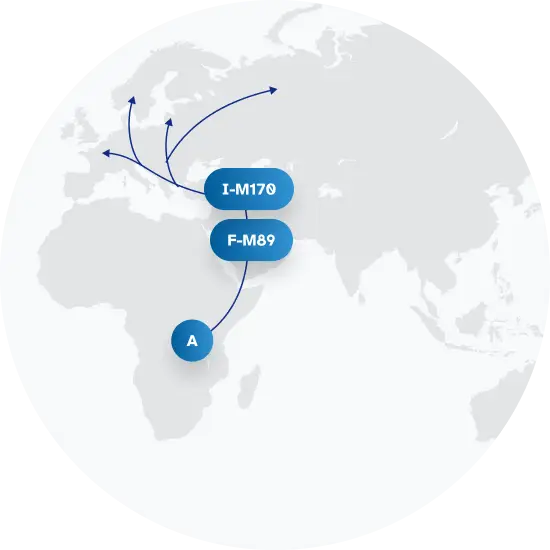Explore the Family Name Hough
How common is the last name Hough in the United States?
Based on the Decennial U.S. Census, the surname Hough has seen a slight fluctuation in popularity over the years. In 2000, it was ranked as the 2208th most popular surname, but by 2010, it had slipped to 2345th. This represents a decrease of 6.2% over a decade. However, the actual count of people with the surname increased from 15,090 in 2000 to 15,549 in 2010, indicating a growth rate of 3.04%. The proportion of individuals named Hough per 100,000 people also saw a drop, going from 5.59 to 5.27, a decline of 5.72%.
| 2000 | 2010 | Change | |
|---|---|---|---|
| Rank | #2,208 | #2,345 | -6.2% |
| Count | 15,090 | 15,549 | 3.04% |
| Proportion per 100k | 5.59 | 5.27 | -5.72% |
Race and Ethnicity of people with the last name Hough
The ethnic identity associated with the Hough surname shows some interesting trends based on data from the Decennial U.S. Census. The majority of those bearing this surname identified as White, although this percentage decreased slightly from 85.73% in 2000 to 83.64% in 2010. The second highest ethnic group were those identifying as Black, which saw a small increase of 5.68%, going from 10.21% in 2000 to 10.79% in 2010. The Hispanic demographic experienced a significant growth of 55.56%, rising from 1.44% to 2.24%. Those identifying as having two or more races also increased by 52.03%, moving from 1.23% to 1.87%. Meanwhile, the Asian/Pacific Islander and American Indian and Alaskan Native groups saw minor changes in their percentages.
| 2000 | 2010 | Change | |
|---|---|---|---|
| White | 85.73% | 83.64% | -2.44% |
| Black | 10.21% | 10.79% | 5.68% |
| Hispanic | 1.44% | 2.24% | 55.56% |
| Two or More Races | 1.23% | 1.87% | 52.03% |
| American Indian and Alaskan Native | 0.66% | 0.75% | 13.64% |
| Asian/Pacific Islander | 0.72% | 0.71% | -1.39% |
Hough ancestry composition
23andMe computes an ancestry breakdown for each customer. People may have ancestry from just one population or they may have ancestry from several populations. The most commonly-observed ancestry found in people with the surname Hough is British & Irish, which comprises 52.1% of all ancestry found in people with the surname. The next two most common ancestries are French & German (26.0%) and Scandinavian (4.2%). Additional ancestries include Eastern European, Italian, Spanish & Portuguese, Nigerian, and Ashkenazi Jewish.
Ready to learn more about your ancestry? Get the most comprehensive ancestry breakdown on the market by taking our DNA test. Shop 23andMe
| ANCESTRY BREAKDOWN | COMPOSITION |
|---|---|
| British & Irish | 52.1% |
| French & German | 26.0% |
| Scandinavian | 4.2% |
| Other | 17.7% |

Possible origins of the surname Hough
Your DNA provides clues about where your recent ancestors may have lived. Having many distant relatives in the same location suggests that you may all share common ancestry there. Locations with many distant relatives can also be places where people have migrated recently, such as large cities. If a large number of individuals who share your surname have distant relatives in a specific area, it could indicate a connection between your surname and that location, stemming from either recent ancestral ties or migration.
Based on 23andMe data, people with last name Hough have recent ancestry locations in the United Kingdom of Great Britain and Northern Ireland and Ireland.
| RECENT ANCESTRY Location | Percentage |
|---|---|
| Merseyside, United Kingdom | 86.10% |
| Greater Manchester, United Kingdom | 86.10% |
| Greater London, United Kingdom | 86.10% |
| Glasgow City, United Kingdom | 86.10% |
| West Yorkshire, United Kingdom | 85.90% |
What Hough haplogroups can tell you
Haplogroups are genetic population groups that share a common ancestor on either your paternal or maternal line. These paternal and maternal haplogroups shed light on your genetic ancestry and help tell the story of your family.
The top paternal haplogroup of people with the surname Hough is I-P109, which is predominantly found among people with European ancestry. Haplogroup I-P109 is descended from haplogroup I-M170. Other common haplogroups include R-CTS241 and I-L233, which are predominantly found among people with European and European ancestry. Other surnames with similar common haplogroups are: Gentry, Niles, Rushing, Hamby, Westmoreland, Foust, Dyson, Copley, Lemaster, Julian.
The most common maternal haplogroups of people with Hough surname are: H1, T2b, H. These most commonly trace back to individuals of European ancestry.
 Paternal Haplogroup Origins I-M170
Paternal Haplogroup Origins I-M170
Your paternal lineage may be linked to many northern European men
If you have haplogroup I1a1b, your paternal line stems from a young branch of I-M253 called I-L22, which likely arose in the last 3,000 years. I-L22 is most common in Northern Europe, but a recent study found that this haplogroup was present in a significant portion of the Partecipanza population living in San Giovanni in Persiceto, Italy. The area of San Giovanni in Persiceto was involved in a migration period in 728 AD, when it became part of the Lombard kingdom, under King Aistulf. San Giovanni in Persiceto was only under Lombard rule for 48 years, after which the Lombards were defeated by King Charlemagne in 776 AD. There are several characteristics of San Giovanni in Persiceto that link it to other Lombard settlements. For instance, some research suggests San Giovanni in Persiceto was the seat of a Lombard Duke between 750 and 800 AD. It is possible that the Lombards who ruled over San Giovanni in Persiceto played an important role in the introduction and growth of haplogroup I-L22 in the region.
Your maternal lineage may be linked to Marie Antoinette
Because it is so dominant in the general European population, haplogroup H also appears quite frequently in the continent's royal houses. Marie Antoinette, an Austrian Hapsburg who married into the French royal family, inherited the haplogroup from her maternal ancestors. So did Prince Philip, Duke of Edinburgh, whose recorded genealogy traces his female line to Bavaria. Scientists also discovered that famed 16th century astronomer Nicolaus Copernicus traced his maternal lineages to haplogroup H.

What do people with the surname Hough have in common?
Spoiler alert: it's complicated. People with the same last name are usually no more genetically similar than a randomly sampled group of people from the same population. That said, people with the same surname are more likely to have similar ancestries than randomly sampled individuals. The reason is the tendency of people with similar cultural or geographical backgrounds to preferentially mate with one another. That's why people who share a surname may be more likely to share traits and tendencies in common than people within the general population. Check out the percentages below to see the prevalences of tastes, habits, and traits of people with your surname compared with prevalences among 23andMe users.
Preferences
Traits
Habits
Wellness
Are health conditions linked to the last name Hough?
The short answer is that, if there is an association between surname and health, it's usually more about your ancestry than your name. Individuals with a given surname are no more genetically similar than the general population but often have similar ancestries. The populations of people associated with those shared ancestries often have sets of genetic variations, also known as alleles, in common. Some of those alleles are associated with a greater likelihood of developing certain diseases.
Disease variant frequency by ancestry
Disease allele frequencies in populations associated with the surname Hough are shown below. Important Note: not everyone with a disease allele will develop these health condition
























